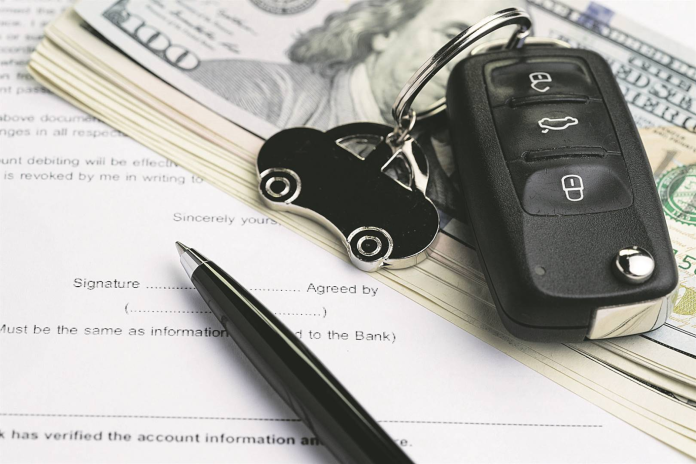How to Sell a Financed Car Without Paying It Off
Selling a financed car can be a daunting task, especially when you still owe money on it. However, it is not impossible. With the right approach and knowledge, you can successfully sell your financed car without paying it off completely. In this article, we will guide you through the steps and options available to make this process easier and more manageable.
Understand Your Car’s Value
Before diving into selling your financed car, it’s crucial to know its current market value. This will give you a realistic idea of how much you can expect to sell it for. Various online platforms, such as Kelley Blue Book or Edmunds, can help you determine your car’s worth based on its make, model, year, condition, and mileage.
Contact Your Lender
Reach out to your auto lender to understand the exact amount you still owe on the car. Request a payoff quote, which will include the remaining principal balance and any additional fees or interest that may apply. Knowing this amount is vital in determining your selling price and negotiating with potential buyers.
Selling for the Right Price
Since you won’t be paying off the entire loan before selling, you’ll need to find the right balance for your selling price. Ideally, you want to cover your outstanding loan balance with the sale proceeds. However, keep in mind that potential buyers will expect some negotiation room. Set a reasonable selling price that is fair for both you and the buyer.
Sell Privately or Trade-In?
When selling a financed car, you have two primary options: selling it privately or trading it in at a dealership. Selling privately may yield a higher selling price, but it requires more effort in advertising and meeting with potential buyers. On the other hand, trading it in at a dealership can be more convenient, but you might get a lower price for your car.
Providing Full Disclosure
Honesty is key when selling a financed car. Make sure to inform potential buyers about the existing loan on the vehicle. Offer transparency by providing all the necessary information about the loan, including the remaining balance and any other relevant details. Being upfront will build trust and credibility with potential buyers.
Settling the Loan
When you find a buyer, work with your lender to facilitate the loan payoff process. Coordinate with the buyer to ensure that the payment goes directly to the lender to settle the remaining balance. Once the loan is paid off, the lender will release the car’s title to the new owner.

Handling Negative Equity
Negative equity, also known as being “upside down” on your loan, occurs when you owe more on the car than its current value. If your car’s value is lower than the remaining loan balance, you’ll need to cover the difference. Discuss this situation with your lender and explore your options for handling negative equity.
Promote the Sale
When selling a financed car privately, create compelling listings to attract potential buyers. Use high-quality images and write a detailed description highlighting the car’s best features and its well-maintained condition. Advertise on various platforms and leverage social media to reach a broader audience.
Preparing the Paperwork
Gather all the necessary paperwork for a smooth sale. This includes the car’s title, service records, maintenance history, and any warranty information. Having organized and complete paperwork will instill confidence in potential buyers and make the process easier.
Meeting Potential Buyers
Arrange meetings with potential buyers in safe and public locations. Accompany a trusted friend or family member to ensure your safety during these interactions. Be prepared to answer any questions they might have about the car, its history, and the loan status.
Read More: How long can you finance a boat
Negotiating the Deal
Be open to negotiation while selling a financed car. Buyers may want to negotiate the price, or they might request certain repairs or additions. Be flexible but also stick to your bottom line to avoid underselling the car.
Finalizing the Sale
Once you agree on the selling price with a buyer, complete all the necessary paperwork to transfer ownership. Sign over the title and any other required documents to the new owner. Ensure that the payment goes directly to your lender to settle the remaining loan balance.
Selling a financed car without paying it off completely requires careful planning and honest communication. By understanding your car’s value, working with your lender, and promoting the sale effectively, you can successfully navigate this process. Remember to prioritize transparency and provide full disclosure to potential buyers to build trust and ensure a successful sale.
Handling Transfer of Ownership
Once the sale is finalized, make sure to transfer the ownership of the car properly. Notify your local Department of Motor Vehicles (DMV) about the sale and submit the necessary paperwork to transfer the title to the new owner. This step is crucial to avoid any legal or financial liabilities associated with the car after the sale.

Paying Off the Loan
After the sale, promptly contact your lender to ensure they have received the payment from the buyer. Confirm that the loan has been paid off in full and obtain a statement or letter from the lender stating that the loan is closed. Keep this document for your records as proof of the loan settlement.
Conclusion:
Before finalizing the sale, it’s essential to verify the credibility of the buyer. Ensure that they have a valid driver’s license and are of legal age to own a vehicle. Avoid accepting payments from unknown or suspicious sources to prevent potential scams or fraud.
FAQs
- Can I sell a financed car privately if the lender holds the title?
Yes, you can sell a financed car privately even if the lender holds the title. Once you find a buyer and agree on the selling price, coordinate with your lender to facilitate the transfer of the title to the new owner.
- Can I transfer the loan to the new owner instead of paying it off?
In most cases, auto loans are non-transferable, and the new owner will need to secure their financing. However, it’s essential to check with your lender to see if they offer any transfer options.
- What if I owe more on the loan than the car’s value?
If you owe more on the loan than the car’s value, you are in a state of negative equity. In such a scenario, you’ll need to cover the difference between the car’s value and the remaining loan balance to settle the debt.
- How can I ensure a smooth sale of my financed car?
To ensure a smooth sale, be transparent about the car’s history, loan status, and condition. Provide complete paperwork and be willing to negotiate with potential buyers to reach a fair selling price.
- Can I sell a financed car if it has been involved in an accident?
Yes, you can sell a financed car that has been involved in an accident. However, you must disclose the accident history to potential buyers. An accident may impact the car’s value, so be prepared for negotiations based on the extent of the damage and repairs.











